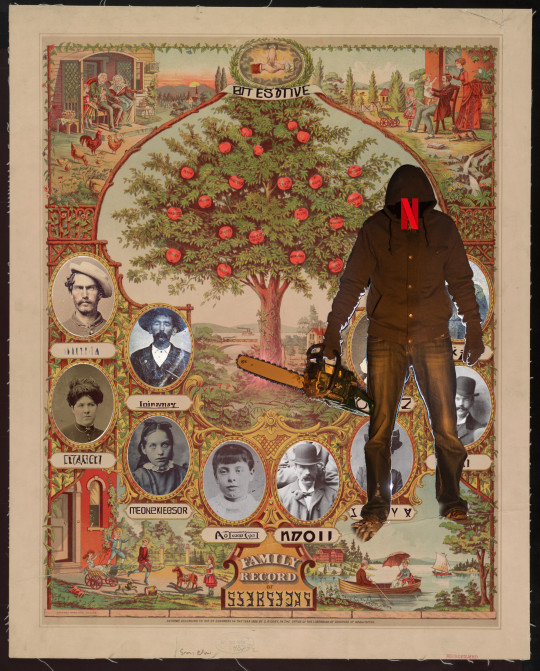#ambiguity
Text
Netflix wants to chop down your family tree

Netflix has unveiled the details of its new anti-password-sharing policy, detailing a suite of complex gymnastics that customers will be expected to undergo if their living arrangements trigger Netflix’s automated enforcement mechanisms:
https://thestreamable.com/news/confirmed-netflix-unveils-first-details-of-new-anti-password-sharing-measures
If you’d like an essay-formatted version of this post to read or share, here’s a link to it on pluralistic.net, my surveillance-free, ad-free, tracker-free blog:
https://pluralistic.net/2023/02/02/nonbinary-families/#red-envelopes
Netflix says that its new policy allows members of the same “household” to share an account. This policy comes with an assumption: that there is a commonly understood, universal meaning of “household,” and that software can determine who is and is not a member of your household.
This is a very old corporate delusion in the world of technology. In the early 2000s, I spent years trying to bring some balance to an effort at DVB, whose digital television standards are used in most of the world (but not the USA) when they rolled out CPCM, a DRM system that was supposed to limit video-sharing to a single household.
Their term of art for this was the “authorized domain”: a software-defined family unit whose borders were privately negotiated by corporate executives from media companies, broadcasters, tech and consumer electronics companies in closed-door sessions all around the world, with no public minutes or proceedings.
https://onezero.medium.com/the-internet-heist-part-iii-8561f6d5a4dc
These guys (they were nearly all guys) were proud of how much “flexibility” they’d built into their definition of “household.” For example, if you owned a houseboat, or a luxury car with seatback displays, or a summer villa in another country, the Authorized Domain would be able to figure out how to get the video onto all those screens.
But what about other kinds of families? I suggested that one of our test cases should be a family based in Manila: where the dad travels to remote provinces to do agricultural labor; the daughter is a nanny in California; and the son is doing construction work in the UAE. This suggestion was roundly rejected as an “edge case.”
Of course, this isn’t an edge case. There are orders of magnitude more people whose family looks like this than there are people whose family owns a villa in another country. Owning a houseboat or a luxury car makes you an outlier. Having an itinerant agricultural breadwinner in your family does not.
But everyone who is in the room when a cartel draws up a standard definition of what constitutes a household is almost certainly drawn from a pool that is more likely to have a summer villa than a child doing domestic work or construction labor half a world away. These weirdos, so dissimilar from the global majority, get to define the boxes that computers will shove the rest of the world into. If your family doesn’t look like their family, that’s tough: “Computer says no.”
One day at a CPCM meeting, we got to talking about the problem of “content laundering” and how the way to prevent it would be to put limits on how often someone could leave a household and join another one. No one, they argued, would ever have to change households every week.
I put my hand up and said, “What about a child whose divorced parents share custody of her? She’s absolutely going to change households every week.” They thought about it for a moment, then the rep from a giant IT company that had recently been convicted of criminal antitrust violations said, “Oh, we can solve that: we’ll give her a toll-free number to call when she gets locked out of her account.”
That was the solution they went with. If you are a child coping with the dissolution of your parents’ marriage, you will have the obligation to call up a media company every month — or more often — and explain that Mummy and Daddy don’t love each other any more, but can I please have my TV back?
I never forgot that day. I even wrote a science fiction story about it called (what else?) “Authorized Domain”:
https://craphound.com/news/2011/10/31/authorised-domain/
I think everyone understood that this was an absurd “solution,” but they had already decided that they were going to complete the seemingly straightforward business of defining a category like “household” using software, and once that train left the station, nothing was going to stop it.
This is a recurring form of techno-hubris: the idea that baseline concepts like “family” have crisp definitions and that any exceptions are outliers that would never swallow the rule. It’s such a common misstep that there’s a whole enre* called “Falsehoods Programmers Believe About ______”:
https://github.com/kdeldycke/awesome-falsehood
In that list: names, time, currency, birthdays, timezones, email addresses, national borders, nations, biometrics, gender, language, alphabets, phone numbers, addresses, systems of measurement, and, of course, families. These categories are touchstones in our everyday life, and we think we know what they mean — but then we try to define them, and the list of exceptions spirals out into a hairy, fractal infinity.
Historically, these fuzzy categorical edges didn’t matter so much, because they were usually interpreted by humans using common sense. My grandfather was born “Avrom Doctorovitch” (or at least, that’s one way to transliterate his name, which was spelled in a different alphabet, but which was also transliterating his first name from yet another alphabet). When he came to Canada as a refugee, his surname was anglicized to “Doctorow.” Other cousins are “Doctorov,” “Doctoroff,” and “Doktorovitch.”
Naturally, his first name could have been “Abraham” or “Abe,” but his first employer (a fellow Eastern European emigre) decided that was too ethnic and in sincere effort to help him fit in, he called my grandfather “Bill.” When my grandfather attained citizenship, his papers read “Abraham William Doctorow.” He went by “Abe,” “Billy,” “Bill,” “William,” “Abraham” and “Avrom.”
Practically, it didn’t matter that variations on all of these appeared on various forms of ID, contracts, and paperwork. His reparations check from the German government had a different variation from the name on the papers he used to open his bank account, but the bank still let him deposit it.
All of my relatives from his generation have more than one name. Another grandfather of mine was born “Aleksander,” and called “Sasha” by friends, but had his name changed to “Seymour” when he got to Canada. His ID was also a mismatched grab-bag of variations on that theme.
None of this mattered to him, either. Airlines would sell him tickets and border guards would stamp his passport and rental agencies would let him drive away in cars despite the minor variations on all his ID.
But after 9/11, all that changed, for everyone who had blithely trundled along with semi-matching names across their official papers and database entries. Suddenly, it was “computer says no” everywhere you turned, unless everything matched perfectly. There was a global rush for legal name-changes after 9/11 — not because people changed their names, but because people needed to perform the bureaucratic ritual necessary to have the name they’d used all along be recognized in these new, brittle, ambiguity-incinerating machines.
For important categories, ambiguity is a feature, not a bug. The fact that you can write anything on an envelope (including a direction to deliver the letter to the granny flat over the garage, not the front door) means that we don’t have to define “address” — we can leave it usefully hairy around the edges.
Once the database schema is formalized, then “address” gets defined too — the number of lines it can have, the number of characters each line can have, the kinds of characters and even words (woe betide anyone who lives in Scunthorpe).
If you have a “real” address, a “real” name, a “real” date of birth, all of this might seem distant to you. These “edge” cases — seasonal agricultural workers, refugees with randomly assigned “English” names — are very far from your experience.
That’s true — for now (but not forever). The “Shitty Technology Adoption Curve” describes the process by which abusive technologies work their way up the privilege gradient. Every bad technological idea is first rolled out on poor people, refugees, prisoners, kids, mental patients and other people who can’t push back.
Their bodies are used to sand the rough edges and sharp corners off the technology, to normalize it so that it can climb up through the social ranks, imposed on people with more and more power and influence. 20 years ago, if you ate your dinner under an always-on #CCTV, it was because you were in a supermax prison. Today, it’s because you bought a premium home surveillance system from Google, Amazon or Apple.
https://pluralistic.net/2021/07/29/impunity-corrodes/#arise-ye-prisoners
The Netflix anti-sharing tools are designed for rich people. If you travel for business and stay in the kind of hotel where the TV has its own Netflix client that you can plug your username and password into, Netflix will give you a seven-day temporary code to use.
But for the most hardcore road-warriors, Netflix has thin gruel. Unless you connect to your home wifi network every 31 days and stream a show, Netflix will lock out your devices. Once blocked, you have to “contact Netflix” (laughs in Big Tech customer service).
Why is Netflix putting the screws to its customers? It’s part of the enshittification cycle, where platform companies first allocate surpluses to their customers, luring them in and using them as bait for business customers. Once they turn up, the companies reallocate surpluses to businesses, lavishing them with low commissions and lots of revenue opportunities. And once they’re locked in, the company starts to claw back the surpluses for itself.
https://pluralistic.net/2023/01/21/potemkin-ai/#hey-guys
Remember when Netflix was in the business of mailing red envelopes full of DVDs around the country? That was allocating surpluses to users. The movie companies hated this, viewed it as theft — a proposition that was at least as valid as Netflix’s complaints about password sharing, but every pirate wants to be an admiral, and when Netflix did it to the studios, that was “progress,” but when you do it to Netflix, that’s theft.
Then, once Netflix had users locked in and migrated to the web (and later, apps), it shifted surpluses to studios, paying fat licensing fees to stream their movies and connect them to a huge audience.
Finally, once the studios were locked in, Netflix started to harvest the surplus for its shareholders: raising prices, lowering streaming rates, knocking off other studios’ best performing shows with in-house clones, etc. Users’ surpluses are also on the menu: the password “sharing” that let you define a household according to your family’s own idiosyncratic contours is unilaterally abolished in a quest to punish feckless Gen Z kids for buying avocado toast instead of their own Netflix subscriptions.
Netflix was able to ignore the studios’ outraged howls when it built a business by nonconsenually distributing their products in red envelopes. But now that Netflix has come for your family, don’t even think about giving Netfix some of what it gave to the MPAA.
As a technical matter, it’s not really that hard to modify Netflix’s app so that every stream you pull seems to come from your house, no matter where you are. But doing so would require reverse-engineering Netflix’s app, and that would violate Section 1201 of the DMCA, the CFAA, and eleventy-seven other horrible laws. Netflix’s lawyers would nuke you until the rubble bounced.
When Netflix was getting started, it could freely interoperate with the DVDs that the studios had put on the market. It could repurpose those DVDs in ways that the studios strenuously objected to. In other words, Netfix used adversarial interoperability (AKA Competitive Compatibility or ComCom) to launch its business:
https://www.eff.org/deeplinks/2019/10/adversarial-interoperability
Today, Netflix is on the vanguard of the war to abolish adversarial interop. They helped lead the charge to pervert W3C web-standards, creating a DRM video standard called EME that made it a crime to build a full-featured browser without getting permission from media companies and restricting its functionality to their specifications:
https://blog.samuelmaddock.com/posts/the-end-of-indie-web-browsers/
When they used adversarial interoperability to build a multi-billion-dollar global company using the movie studios’ products in ways the studios hated, that was progress. When you define “family” in ways that makes Netflix less money, that’s felony contempt of business model.
[Image ID: A Victorian family tree template populated by tintypes of old-timey people. In the foreground stands a menacing, chainsaw-wielding figure, his face obscured by a hoodie. The blade of the chainsaw is poised to chop down the family tree. A Netflix 'N' logo has been superimposed over the man's face.]
#pluralistic#enshittification#shitty technology adoption curve#cpcm#interoperabiltiy#comcom#adversarial interoperability#interop#netflix#family#ambiguity#digitizatio#nym wars#authorized domain#dvb#dvds#password sharing
7K notes
·
View notes
Text
Do not live half a life
and do not die a half death.
If you choose silence, then be silent.
When you speak, do so until you are finished.
If you accept, then express it bluntly.
Do not mask it.
If you refuse then be clear about it
for an ambiguous refusal is but a weak acceptance.
Do not accept half a solution.
Do not believe half truths.
Do not dream half a dream.
Do not fantasize about half hopes.
Half the way will get you nowhere.
You are a whole that exists to live a life
not half a life.
Khalil Gibran.
#quote of the day#quote of today#inspirational quotes#khalil gilbran#life#death#silence#speech#acceptance#refusal#clarity#ambiguity#solutions#truths#dreams#fantasy#ways#a whole life#a life with a meaning#a life worth living
163 notes
·
View notes
Text

Ballerina in a Death's Head, Salvador Dalí, 1937-39
#art#salvador dali#1930s#ambiguity#optical illusion#surrealism#skulls#death head#symbolism#dali#memento mori#spanish artists#ballerina in a death's head
55 notes
·
View notes
Text
I know I wasn't supposed to.
But I went into the woods.
Another me came out.
We seem to be equally suspicious that the other is the imposter. I keep checking him for roots and he keeps doing the same to me. Is it a double bluff? Is he gaslighting me into thinking I'm the neverwas thing and he's the human being with organs and anxiety? Is he truly unaware he's a mockery given shape? If he can be unaware of it, I can be too.
That's kind of a lonely thought, really.
-
It's been several days and the tests are all inconclusive. We both bleed normal blood that doesn't turn into a spider and jump to the ceiling when you touch it with a hot wire. We know the same trivia. We pretended to know the same stuff we forgot that we were embarrassed not to remember. We both got uncomfortable at the exact same time when we walked into the cathedral.
We arm wrestled and didn't tie somehow, but we weren't sure if winning meant he was more likely to be fake or less likely.
I worry that we don't really know anything about accursed other selves from the woods.
Wikipedia has been less than helpful.
-
Mom claims she knows which one of us is her 'first boy' but refuses to tell us on the basis that she loves us both and thinks we should get along.
He thinks she can't tell and is too embarrassed to tell us. I think its because she wants to double her chance at grandkids. The difference in opinion is interesting, but is it a sign of an imposter, or the divergence of our experiences?
-
We've decided to flip for the job. I won, so I don't have to find new work. I don't know if that's a win.
I think the curse is that neither one of us is an unnatural imposter out to kill the other. Or else whichever one of us is the monster has realized they don't think my life is worth killing to steal.
I know I think about smashing that copy of my own face open with a rusty fire axe, a gush of sea water and blasphemous screams roiling from the empty hole that should contain bone and brains, and it just seems like a lot of trouble and effort.
I think I'm going to start going by my middle name.
-
Another me just showed up on our doorstep.
He's caked in mud, sticks and twigs in his hair, babbling about harrowing experiences. I'm fixing him some tea while the other-other me hands him the pamphlet we made just in case.
Now he's telling us about the Night King. Like we don't know.
I need a bigger place.
70 notes
·
View notes
Quote
The slippages, the ambiguities, the mistakes are, finally, what make language function in the first place.
Samuel R. Delany, "Some Remarks on Narrative and Technology"
#ambiguity#error#mistakes#distinctions#language#metaphor#meaning#quotes#Delany#Samuel R. Delany#Some Remarks on Narrative and Technology
35 notes
·
View notes
Text
"'The Ones Who Walk Away From Omelas' is a work of almost flawless ambiguity.
At once universally applicable and devilishly vague, Ursula K. Le Guin’s 1973 short story examines a perfect utopia built around the perpetuation of unimaginable cruelty upon a helpless, destitute child. It spans a mere 2800 words and yet evokes a thousand social ills past and present, real and possible, in the mind of the reader — all the while committing to precisely none of them.
Is it about income inequality? Unequal treatment under the criminal justice system? The tension between extractive bourgeois and extracted proletariat? Any one of these would feel simplistic in the face of the story itself, which bucks and weaves between gentle fable and pointed taunt, never quite allowing the reader to get their footing, leaving them to marinate in unease and uncertainty over what somehow feels like a pointed accusation despite never — quite — being spoken aloud.
One moment Le Guin dwells on rich descriptions of the Omelans’ happy lives (parades, horses with braided manes, jolly flute music), the next she interrogates the reader about whether they believe the utopia laid out before them is even possible, while hinting darkly at the revelation to come. And once the titular 'ones who walk away' do appear — those unhappy Omelans who, once they know the horrible secret, can no longer stomach their utopia and wander off into the desert in desperate search of something else — it is not to give the reader relief or a sense of shared triumph over a cruel system, but to simultaneously implicate us for our own inactions and remind us that moral righteousness alone is not enough to guarantee happiness and success.
'Omelas' is a masterpiece, a fable that is all the more gripping for its puzzling lack of moral. But this powerful ambiguity is at the heart of both the story’s staying power and its strange ability to confound both readers and other writers — a pointed refusal to provide an easy answer that makes the story so good, so lasting, and so effective, and yet simultaneously such a broad target for misguided interpretations and bad-faith criticism alike."
- Kurt Schiller, from "Omelas, Je T'aime." Blood Knife, 8 July 2022.
#kurt schiller#ursula k. le guin#quote#quotations#the ones who walk away from omelas#short stories#literature#storytelling#fantasy#ambiguity#activism#inequality
118 notes
·
View notes
Text
oh my job it's vingt mille lieues sous les mers not as in vingt mille lieues de profondeur mais comme,,, on a traversé vingt mille lieues du monde pendant qu'on était sous les mers. i'm such an idiot. here i am three chapters from the end like "but when are they gonna go all 20000 leagues down"
#one time they went 4k leagues down and it was this huge big deal#so i was like damn wait till they go the whole 20k!!#french#ambiguity#jules verne#vingt mille lieues sous les mers#my posts
45 notes
·
View notes
Text




✦ㅤENNORMiSSEㅤA gender That feels / is Paradoxical. A enigma Of ambiguity , Evident anomaly && incongruousness , A contradiction of Puzzles , a Numb mystery At it ' s Journey , anomalous Essence && Similars.

[ PT / Ennormisse: a gender that feels/is paradoxical. a enigma of ambiguity, evident anomaly and incongruousness, a contradiction of puzzles, a numb mystery at it's journey, anomalous essence and similars. / END PT. ]

─── ✦✦✦ ───ㅤCoined by The Prince.ㅤㅤㅤㅤㅤㅤㅤㅤㅤㅤㅤㅤㅤ─── ✦✦✦ ───ㅤRequested by Noboo.

#✦⠀⋯⠀In evil Sacrilege#Ennormisse#Paradoxical#Engima#Ambiguity#Anomaly#Incongruousness#Contradiction#Anomalous#mogai#mogai blog#mogai post#mogai friendly#mogai flag#mogai pride#mogai community#mogaireal#mogai identity#mogai gender#mogai heaven#pro mogai#actually mogai#identity coining#liom flag#liom gender#actually liom#paradoxgender
91 notes
·
View notes
Text
Ok, the House of Leaves monsterfucking post made me remember that I once found a House of Leaves crossover fic that was about some anime fandom and the author had titled the fic "Ie no ha" which was obviously supposed to be "house of leaves" in Japanese (because anime), which clearly is the wrong way around and should be "Ha no ie", but the choice of "ha" to mean leaf actually made me seriously think about whether or not the title of the book was supposed to be about leaves from trees, or leaves as in pages of a book, which are different words in Japanese. Because, leaves from trees do not actually appear in the book at all, whereas there is a scene in which the main character reads a book and tears out the pages (=leaves) to burn for light inside the House, and the book is also about itself in a kind of metafictional way. But this scene I think also does not fully explain the title of the book, or why the House is the House of Leaves, and the Norse mythological tree Yggdrasil also appears in the book. The actual translation of the book title into Japanese uses 紙葉, which is not a compound I can actually find anywhere, but 紙 means "paper" and 葉 is the original word "ha" from the fanfic title that means "tree leaf". The Spanish translation uses "hoja" which has the same ambiguity as the English word "leaf", and after that my language skills dry up. So, improptu poll for people who have read it:
47 notes
·
View notes
Text

296 - "Who sang that song???"
There was one time I was asking who in the Beatles sang one of their songs once, and the answer I got back was "The Beatles"
...
YES, BUT WHICH ONE!?
I THINK I FIGURED RINGO OUT, BUT STILL!
#ArtEveryday#art#art every day#the beatles#beatles#john lennon#paul mccartney#ringo starr#george harrison#ambiguity#amongst artists#Maybe I should ask Peter Jackson on some of this#He did a thing#I dunno
15 notes
·
View notes
Text
Let's talk about Will Graham's rollercoaster of motivations :-
The cliff fall scene in the final episode of Hannibal Season 3 is a breathtaking culmination of the intense relationship between Will Graham and Hannibal Lecter. The scene unfolds atop the cliffs of the dramatic Reichenbach Falls, paying homage to Arthur Conan Doyle's iconic location.
In the end, was it revenge or redemption? 🤔 The line blurs as Will grapples with his own darkness, seeking closure in Hannibal's twisted world.
Will's choice to take this drastic step becomes a symbolic act of severing ties, rejecting the entanglement of darkness and manipulation that Hannibal represents in his life. The cliff fall stands as a visceral manifestation of Will's ultimate decision to break free from the destructive bond, even if it means embracing the uncertainty of the fall.Will's choice to take this drastic step becomes a symbolic act of severing ties, rejecting the entanglement of darkness and manipulation that Hannibal represents in his life.
#hannibal meta#hannibal analysis#hannibal#will graham#HannigramCritique#ambiguity#ambigram#there's no murder husbands#it's a rejection from Will's side#the wrath of the lamb#hannibal lecter
15 notes
·
View notes
Text
Commidinity - Commidine
[PT: commidinity - commidine]
Commidinity is the macro-quality that describes any quality characterized by being intermediate, unspecific and/or ambiguous while having clear sense of gender (not being agender, being comgender/allogender) and not being xenine or anything alike. Commidinities also do not feel like they are them combination of anything. It's a feeling of gender intermediateness, gender unspecificity and/or gender ambiguity that its born by itself and not through the combination of two pre-existent qualities.
Alongside outherinity, it's one of the two types of aporinity.
Qualities I see as commidine:
Neutrinity (comgender neutrality)
Epicenity
Ambiguinity and ambiguity
Pandrogyny if we follow the original definition: “a 'third-gender' and a type of gender-neutral living being more akin to the other or internal self”
Androgyny could also be considered a commidinity (and I do consider it one for myself), but only when it's internalised as being in between masculinity and femininity, but not the combination/intersection of those two; and as being categorically different from femmaslinity in that androgyny has a sense of otherness/distinctness, while femmaslinity is the combination/intersection of femininity and masculinity.
The flag:

[ID: A flag with five horizontal stripes, all of different colours, from top to bottom: green, yellow, dark magenta, cyan and violet. All the stripes are the same size. /End ID]
There's no specific meaning for each stripe. I chose those colours because they all are associated with different genders and qualities I wound consider to be commidine.
#neutrinity#epicenity#ambiguinity#ambiguity#androgyny#aporinity#commidinity#new gender quality#gender quality coining
12 notes
·
View notes
Text

The purest and most thoughtful minds are those which love color the most. (John Ruskin)
#investigate#reciprocal#compare#convoluted#transcendental#archetypes#vibrancy#surprising#dialogue#surroundings#charcoal#deviancy#ambiguity#consciousness
18 notes
·
View notes
Text
textbook trope
a dick grayson x reader tale

warnings: big sex, sex scene, we're talking p in v type sex, also swearing, some rough(ish) kinks (it's not the worst, just some minor smacking of one's ass, since i know how raunchy y'all can get), awkward post-sex confrontation with alfred
*18+ only. minors don't look at this
On AO3
#dick grayson#dick grayson x reader#reader is of ambiguous weight and skin color#bc i fucking hate it when its all#“OooOOooo he touched her bone” like bitch what#ambiguity#ambiguity for the fans baby#ao3#dick grayson x plus size reader#some AU where dick likes to be DOMINATED???#like that isnt canon#yall know hes a freak. dont fucking judge me#smut#my post#mine#fic#dc#dcu#batfamily
45 notes
·
View notes
Text

The ambiguity of autumn
November is always a difficult time for me because of the effect it has on my mood but I can't deny how much I like the opportunities it provides for creativity.
#autumn#autumn leaves#autumn vibes#nature#nature photography#nature lovers#nature therapy#fall#mental health#ambiguity#mood#soft#softness#leaves#photographers on tumblr#original work#original content#all my own work#photography is my therapy
14 notes
·
View notes
Quote
On one hand, the various objects of this world offer themselves to anguish as the bait, but in a sense contrary to that of sacrifice: here we are caught in the trap of a small and separate reality, exiled from truth (insofar as the word refers not to a narrow horizon but to the absence of limits). On the other hand, sacrifice promises us the trap of death, for the destruction rendered unto the object has no sense other than the menace that it has for the subject. If the subject is not truly destroyed, everything remains in ambiguity. And if it is destroyed the ambiguity is resolved, but only in a nothingness that abolishes everything. Yet it is from this double bind that the very meaning of art emerges — for art, which puts us on the path of complete destruction and suspends us there for a time, offers us ravishment without death.
Georges Bataille, "The Cruel Practice of Art"
#subjectivity#objectivity#reality#truth#ambiguity#nothingness#meaning#art#creativity#quotes#Bataille#Georges Bataille#The Cruel Practice of Art
62 notes
·
View notes